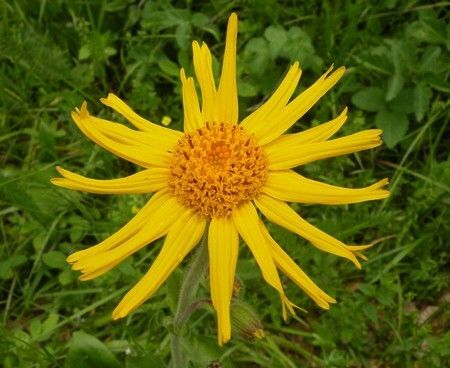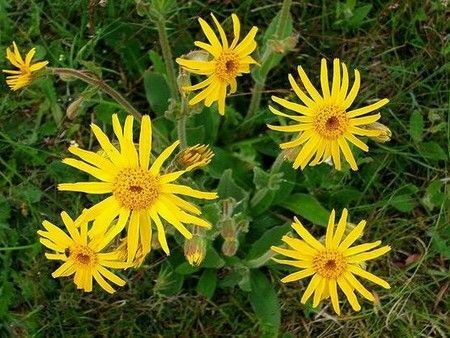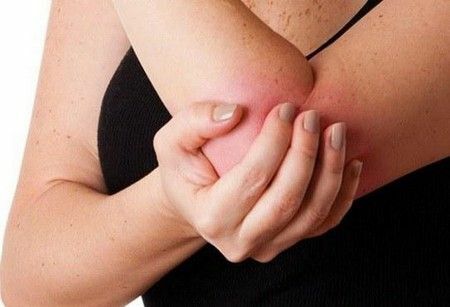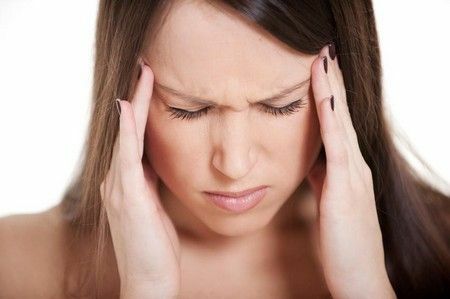Arnica is one of the few medicinal plants that, besides useful substances, contain toxic components in their composition. However, if you approach it correctly, you can protect yourself from harm and significantly improve your health.

Plant characteristics
Mountain arnica is a perennial, which can reach a height of 60 cm. The plant has a thickened short rhizome, dyed in dark brown color, curved, with brittle stiff sprouts. The root of arnica is located at a shallow depth - about 2-3 cm, in some cases can be on the surface of the soil. Its leaves are thick, oblong-ovate, pale green, collected in rosettes. The stem is herbaceous with the apical single inflorescence, and the underdeveloped inflorescence can be found in the sinuses of the upper leaves.
As you can see in the photo, the flowers of arnica outwardly resemble daisies. The petals are woven, curved, so it is impossible to find a flower of regular, even shape. The size of the flower is from 5 to 8 cm.

The area of application of arnica
The curative strength of arnica is known for a long time, and it is applied not only in the field of medicine, but also in cosmetology.
Application of grass
From the dried inflorescences of the plant, alcoholic tincture is prepared, which shows pronounced anti-inflammatory, hemostatic and cholagogue properties. These qualities find their relevance in the treatment of skin diseases.
External means based on arnica mountain used in the form of lotions, moist dressings and compresses with:
- bruises;
- abrasions;
- bruising;
- trophic ulcers;
- burns;
- frostbite;
- sprain;
- diseases of muscles and joints.
Tincture helps to disinfect the wound, stop bleeding and accelerate its healing.

Important! Tincture of arnica can not be used for extensive wounds;Its use is acceptable only with small abrasions and wound.
Also indications for the external use of arnica grass are rheumatic pains and skin inflammations. It is prescribed for rinsing the mouth with diseases of the gums and infectious mucous.
Important! Prolonged use and excess concentration can lead to side effects: blisters on the skin, itching and burning!
For internal use, arnica preparations are recommended extremely rarely, as often their use leads to irritation of the walls of the stomach. Sometimes they are prescribed for myocarditis, angina and hypertension. These drugs help reduce the reflex excitability of the brain, have a calming and anticonvulsant effect. In addition, the curative properties of arnica grass are used to expand the coronary vessels, accelerate the heart rate and increase the amplitude of the heart, improve the supply of the heart muscle, and to lower cholesterol.
Important! Perhaps the occurrence of adverse reactions in the form of dyspnea, nausea, chills, sweating and pain in the abdomen! Therefore, it is forbidden to take arnica uncontrolled!
Use of
oil Arnica oil has also found wide application in the field of medicine. It is used in the following cases:
- joint diseases - radiculitis, osteochondrosis, arthritis, arthrosis;
- external and internal hemorrhoids;
- microcirculatory disturbance and varicose veins;
- to prevent spasms and seizures;
- blood pressure changes;
- influenza and bronchitis;
- concussion and epilepsy;
- liver disease - cholecystitis, hepatitis, cholangitis;
- oncological diseases;
- postpartum haemorrhage;
- gynecological diseases: inflammation of the ovaries, profuse menstruation, complications after abortion;
- trophic ulcers;
- bruises, bruises, bruises.

Important! Remember that the plant is poisonous, so using its oil at home, you should strictly observe the proportions recommended by a specialist.
In addition, the antibacterial and rejuvenating properties of arnica oil have been appreciated and beauticians. This remedy perfectly cares for oily and acne-prone skin. It improves the complexion, regulates the sebaceous glands and smooths the skin tone.
Arnica oil is recommended for use in the treatment of hair from hair loss and dandruff, and also apply before the sessions of manual therapy. On its basis, special masks, creams are created and used in the preparation of essential massage oils.
Contraindications
Note the contraindications to the use of any arnica drugs:
- individual intolerance;
- increased blood coagulability;
- period of pregnancy and lactation;
- children under the age of seven.
Means based on this plant is recommended to use only under the supervision of a doctor and adhering to the indicated daily rate. In case of an overdose, there may be side effects in the form of nausea, vomiting, constipation, seizures, pain in the intestines and stomach. If they occur, seek immediate medical attention.
